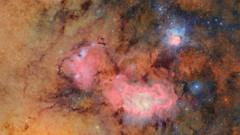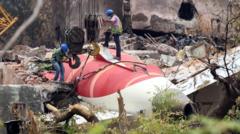As we reflect on the pioneering Apollo missions, we remember the astronauts who took mankind to the Moon, even as the Artemis program aims for a new generation of lunar travelers.
**The Legacy of Apollo: The Last Voices from the Lunar Surface**

**The Legacy of Apollo: The Last Voices from the Lunar Surface**
Exploring the stories of the dwindling Apollo astronauts and the future of lunar exploration.
In a poignant reflection on the Apollo missions, the world is reminded that only five astronauts remain who have walked on the Moon, following the recent passing of Commander Jim Lovell. These pioneers of space exploration navigated the vastness of space during the historic Apollo missions of the late 1960s and early 1970s.
With NASA's Artemis program planning a return to the Moon this decade and China eyeing a lunar presence by 2030, there’s renewed interest in human exploration of the lunar surface. However, NASA's initial timeline for the Artemis 2 mission—a planned crewed expedition—has been postponed until 2026 due to extended preparations. Meanwhile, private companies like SpaceX and Boeing face challenges of their own, including embarrassing setbacks during testing.
The dwindling number of Apollo astronauts underscores the urgency to honor their legacy. Remembering Jim Lovell, who famously led Apollo 13 back to safety after a harrowing near-disaster, we turn our attention to the remaining astronauts, each embodying the spirit of discovery.
**Buzz Aldrin** made headlines as the second human to walk on the Moon during Apollo 11. His tale is filled with territory both tumultuous and triumphant, including a life threatened by detractors who doubted the moon landings. Aldrin’s later years show an unquenchable thirst for adventure as he champions space exploration.
**Charles Duke**, the youngest man to walk on the lunar surface during Apollo 16, recalls the stark beauty of the Moon and remains enthusiastic about future missions. He continues to voice the challenges that incoming astronauts will face amidst awe-inspiring terrains.
**Fred Haise**, who barely escaped disaster with Apollo 13, remains a figure of intrigue, having not landed on the lunar surface himself. Though classified as part of history, he never had the chance for that moonwalk.
**Harrison Schmitt**, the last scientist to explore the Moon, played a vital role in Apollo 17 and translated geological science to public discourse as he later entered politics.
Finally, **David Scott**, commander of Apollo 15, pioneered the lunar rover missions that allowed astronauts to traverse larger expanses of the moon, enhancing our understanding of celestial dynamics in the process.
As these Moon men continue to share their visions and concerns over the future of space exploration, the next generation prepares for what could be another chapter in lunar adventure. With their legacies firmly embedded in history, the question lingers: who will carry the torch forward into the cosmos?
With NASA's Artemis program planning a return to the Moon this decade and China eyeing a lunar presence by 2030, there’s renewed interest in human exploration of the lunar surface. However, NASA's initial timeline for the Artemis 2 mission—a planned crewed expedition—has been postponed until 2026 due to extended preparations. Meanwhile, private companies like SpaceX and Boeing face challenges of their own, including embarrassing setbacks during testing.
The dwindling number of Apollo astronauts underscores the urgency to honor their legacy. Remembering Jim Lovell, who famously led Apollo 13 back to safety after a harrowing near-disaster, we turn our attention to the remaining astronauts, each embodying the spirit of discovery.
**Buzz Aldrin** made headlines as the second human to walk on the Moon during Apollo 11. His tale is filled with territory both tumultuous and triumphant, including a life threatened by detractors who doubted the moon landings. Aldrin’s later years show an unquenchable thirst for adventure as he champions space exploration.
**Charles Duke**, the youngest man to walk on the lunar surface during Apollo 16, recalls the stark beauty of the Moon and remains enthusiastic about future missions. He continues to voice the challenges that incoming astronauts will face amidst awe-inspiring terrains.
**Fred Haise**, who barely escaped disaster with Apollo 13, remains a figure of intrigue, having not landed on the lunar surface himself. Though classified as part of history, he never had the chance for that moonwalk.
**Harrison Schmitt**, the last scientist to explore the Moon, played a vital role in Apollo 17 and translated geological science to public discourse as he later entered politics.
Finally, **David Scott**, commander of Apollo 15, pioneered the lunar rover missions that allowed astronauts to traverse larger expanses of the moon, enhancing our understanding of celestial dynamics in the process.
As these Moon men continue to share their visions and concerns over the future of space exploration, the next generation prepares for what could be another chapter in lunar adventure. With their legacies firmly embedded in history, the question lingers: who will carry the torch forward into the cosmos?



















